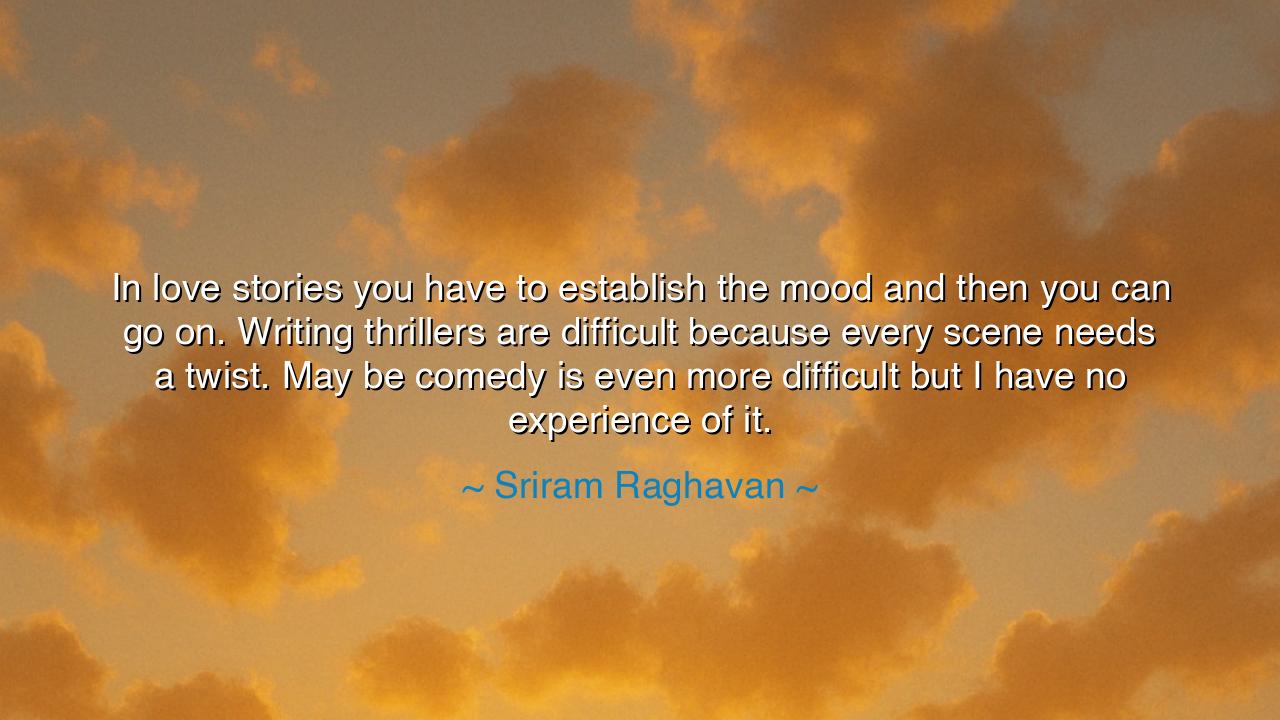
In love stories you have to establish the mood and then you can
In love stories you have to establish the mood and then you can go on. Writing thrillers are difficult because every scene needs a twist. May be comedy is even more difficult but I have no experience of it.






"In love stories you have to establish the mood and then you can go on. Writing thrillers are difficult because every scene needs a twist. Maybe comedy is even more difficult but I have no experience of it." — thus spoke Sriram Raghavan, the craftsman of suspense and the conjurer of mystery, whose films weave webs of deceit and desire, truth and illusion. In these humble yet profound words, he reveals the inner battle of every storyteller — the sacred art of creating emotion, tension, and laughter, and the discipline it demands. Though he speaks as a filmmaker, his insight reaches beyond cinema, into the very heart of creation itself — for every art, like life, requires a balance between structure and surprise, between patience and precision.
When Raghavan speaks of love stories, he speaks of the art of mood — of crafting a world where hearts unfold slowly, like flowers before dawn. Love, he says, begins not in action but in atmosphere. To write of love is to invite the audience into a rhythm of tenderness — a look that lingers, a silence heavy with meaning, a word half-spoken that says more than any speech. Once the mood is born, the story breathes on its own. For love, in its essence, is continuity — it moves like water, flowing gently, deepening with time. Thus, in storytelling as in life, love requires stillness, patience, and the courage to let emotions lead the way.
But thrillers, Raghavan reminds us, are of a different order. Where love flows, suspense coils. The thriller lives in the heartbeat of uncertainty, where every scene must carry a twist — every step must tighten the web, every moment must hold danger or revelation. The creator of thrillers must think not as a lover but as a hunter — calculating, observant, and relentless. To hold the attention of the audience is to hold their breath. It is the art of control, of knowing when to reveal and when to conceal, when to strike and when to wait. Raghavan, master of such craft, understands that to build tension is to build faith — for without trust in the storyteller’s hand, the twists lose their magic.
And then he speaks, almost with reverence, of comedy — the art he claims no experience of, yet honors as perhaps the hardest of all. For what is comedy, if not truth wearing the mask of laughter? It demands not only timing but understanding — the ability to look upon life’s absurdities with both wisdom and mercy. The comedian, like the philosopher, sees deeply, but instead of weeping, he smiles. To make others laugh is to heal them, even if only for a moment. And so, in Raghavan’s acknowledgment lies a profound respect: that while thrillers may challenge the mind, comedy tests the heart’s rhythm, and perhaps, the soul’s grace.
The origin of this insight lies not in books, but in the lived experience of an artist devoted to his craft. Raghavan’s films — from Johnny Gaddaar to Andhadhun — are proof of his restless pursuit of perfection. He knows the pain of creation: the sleepless nights, the rewoven scripts, the delicate balance between logic and emotion. His words echo the wisdom of Leonardo da Vinci, who once said that art is never finished, only abandoned. For the artist, every scene, whether of love, thrill, or laughter, demands surrender — to the work, to the vision, to the unknown hand that guides inspiration.
In these words, Raghavan also offers a reflection on life itself. For life, too, is composed of moods, twists, and moments of laughter. There are days of love — soft, tender, and steady; there are days of suspense — full of fear and uncertainty; and there are days when only laughter can rescue us from despair. To live well is to master all three: to love deeply, to endure tension without breaking, and to laugh even amidst chaos. The storyteller’s craft becomes a mirror for the art of living — a reminder that we are both the writers and the characters in the tale of our days.
So let this be the teaching: Create with awareness. Live with balance. If you write — or love, or lead, or dream — remember that every act of creation requires rhythm. Let love give you warmth, let mystery sharpen your spirit, and let laughter cleanse your heart. Do not rush to fill the silence; let it speak. Do not fear the twist; let it teach. And when joy comes — in comedy or in life — receive it humbly, for it is the rarest gift.
And remember, O seekers of art and wisdom, that every story — like every life — needs contrast to shine. The light of love makes suspense meaningful, and the relief of laughter redeems tragedy. In honoring all three, Sriram Raghavan reveals not only the secret of storytelling but the secret of existence itself: that life, like a great film, is best when it holds mood, surprise, and grace — woven together in the trembling beauty of the human heart.






AAdministratorAdministrator
Welcome, honored guests. Please leave a comment, we will respond soon